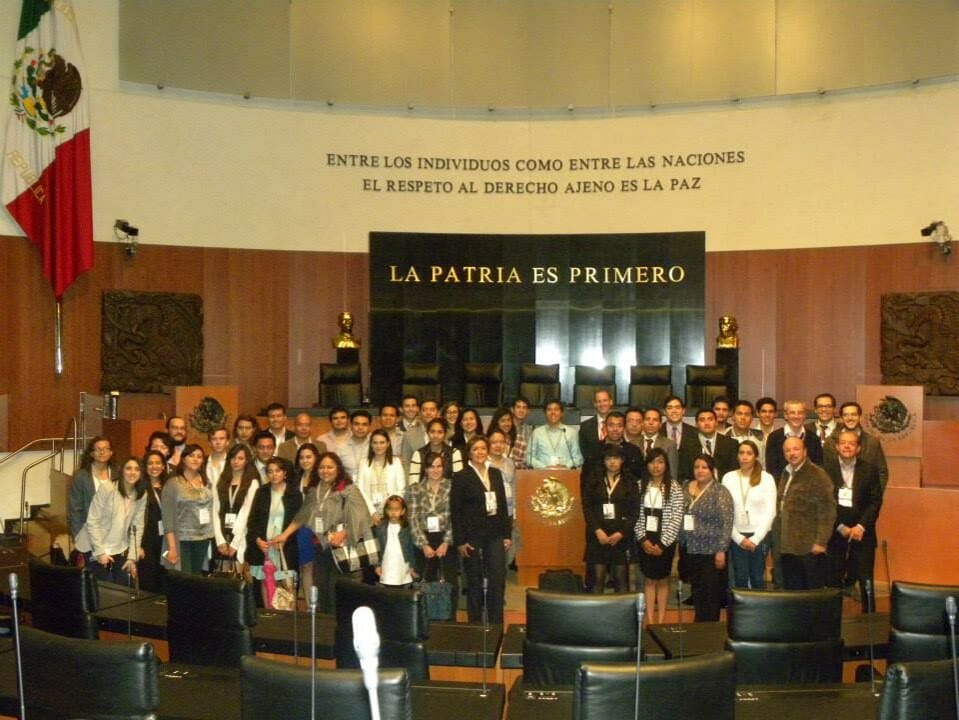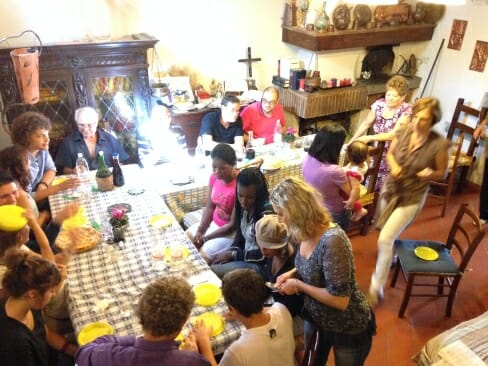
A B&B open to migrants
https://vimeo.com/131567545 Cesar, an 18-year old from Ghana, was saved just when he was about to drown, after he had drunk water and fuel. On that journey, 72 people were saved while 32 died. Maria, a Nigerian and seven months pregnant, had received a phone call from her father while she was out with her husband and little son. He told them not to return home because the church had been burnt and her mother killed. They escaped with the little they had, and arrived in Libya. They had money for the journey to Italy of just one person, and so only she left. Her husband and little son remained on the other side of the Mediterranean, waiting for another embarkment. «These are heartbreaking glimpses of life. They remind us of Jesus’s words: “I was a stranger and you shared your home.” We would like to be the arms and heart for each of these refugees.» This is the story of Carla and David of Florence (Italy), who as a family opened their hearts to the welcoming of migrants. «In summer 2013, we participated with our three kids in the World Youth Day in Brazil. We took the opportunity then to spend some time to do missionary work in Salvador Bahia. It was a strong experience that opened our hearts to the spirit of sharing with those in need. Once we returned home, we decided to dedicate a part of the B&B we run to migrants. In that moment the mission had come to us! Since then, 756 people have passed through, coming from Syria, Pakistan, Nepal, Bangladesh and some countries of Africa. Some stayed only to take refreshments and depart for other European destinations while others remained longer. And in these cases, our relationships became close and very fraternal. 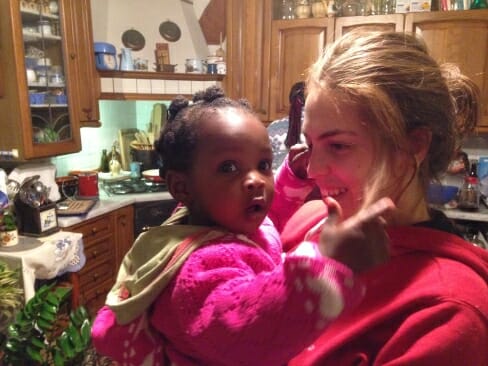 An Eritrean family now on its way to Norway, stayed for two months: he is Muslim while she is Christian, with six children who were left free by their father to choose their religion. When their mother arrived with the youngest son, they were hospitalized for dehydration, after which so also was the father, due to an infection. We remember their joy when we handed them a cell phone so that they could call their relatives to say they were all alive and well. On Sunday we all went to mass together in that tiny Church at the outskirts of Florence where Cardinal Betori was holding a pastoral visit. His whole homily centred on welcoming the homeless. In the end he embraced them and blessed everyone.
An Eritrean family now on its way to Norway, stayed for two months: he is Muslim while she is Christian, with six children who were left free by their father to choose their religion. When their mother arrived with the youngest son, they were hospitalized for dehydration, after which so also was the father, due to an infection. We remember their joy when we handed them a cell phone so that they could call their relatives to say they were all alive and well. On Sunday we all went to mass together in that tiny Church at the outskirts of Florence where Cardinal Betori was holding a pastoral visit. His whole homily centred on welcoming the homeless. In the end he embraced them and blessed everyone.  Three girls, one from Mali and another from Libya, both Muslims, came together with a young girl who escaped from Nigeria after witnessing the massacre of their parents because they were Christians. A sisterly relationship was created between them and with us, as if between parents and daughters. One Sunday while we were taking a walk, Mersi was very sad because that day on TV there was the news of another massacre in Nigeria. Finally, they received a phone call: their younger sister was able to escape to Libya with her father’s friend. The Libyan girl immediately contacted her family and the child – a Christian – was taken in by them who were Muslims. Here’s another picture: of Joy and Lorenz, who had seen their father killed because he was a Christian. I, David, as a social worker can get on the bus when refugees arrive. I do this at the risk of contracting diseases, but I know that the first approach is fundamental since it is then that we are able to identify the groups that, in the meantime, have been created among them. I saw that Joy was pregnant, and so I invited them to our centre. Also when the Prefecture moved them to another place, we continued to visit them, and when the baby was born, we brought them a pram and clothes which the New Families of the Focolare had gathered for them. Joy and Lorenz asked us to be little John’s godparents. This family was then sent to Puglia. The parting was strong but the relationship continues. The call us Mom and Dad. When they obtain their stay permit, they want to come to live close to us.»
Three girls, one from Mali and another from Libya, both Muslims, came together with a young girl who escaped from Nigeria after witnessing the massacre of their parents because they were Christians. A sisterly relationship was created between them and with us, as if between parents and daughters. One Sunday while we were taking a walk, Mersi was very sad because that day on TV there was the news of another massacre in Nigeria. Finally, they received a phone call: their younger sister was able to escape to Libya with her father’s friend. The Libyan girl immediately contacted her family and the child – a Christian – was taken in by them who were Muslims. Here’s another picture: of Joy and Lorenz, who had seen their father killed because he was a Christian. I, David, as a social worker can get on the bus when refugees arrive. I do this at the risk of contracting diseases, but I know that the first approach is fundamental since it is then that we are able to identify the groups that, in the meantime, have been created among them. I saw that Joy was pregnant, and so I invited them to our centre. Also when the Prefecture moved them to another place, we continued to visit them, and when the baby was born, we brought them a pram and clothes which the New Families of the Focolare had gathered for them. Joy and Lorenz asked us to be little John’s godparents. This family was then sent to Puglia. The parting was strong but the relationship continues. The call us Mom and Dad. When they obtain their stay permit, they want to come to live close to us.»
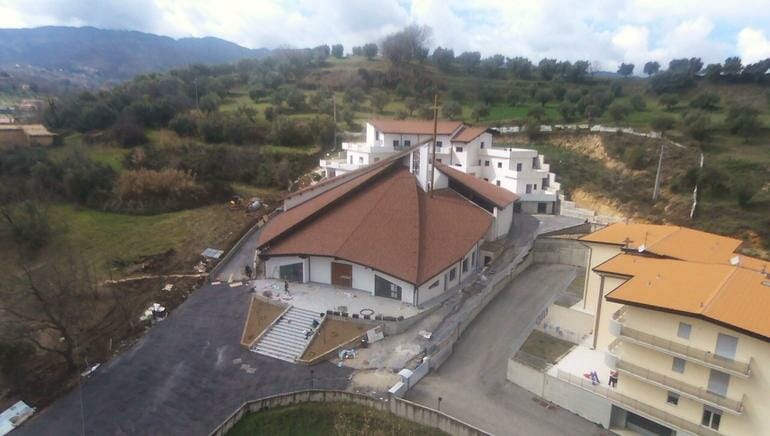
New Ave Centre church in Calabria & “Dialogue in Architecture” conference in Barcelona
 On 20 March the new parish church, dedicated to Christ the Saviour, was inaugurated in Mendicino, in Cosenza, Italy. The event was celebrated on the anniversary of Msgr. Nunnari and it fulfilled the dream of the entire parish community, composed of 10,000 inhabitants, which now enjoys a place of worship of an extremely unique structure. It comprises about 15 rooms for catechism lessons, a meeting hall and presbytery. The project, carried out by means of technical support by local experts, was designed by The Ave Arts Centre in Loppiano, which designs are inspired by research done through the years by a team of architects who work in the little town of the Focolare.
On 20 March the new parish church, dedicated to Christ the Saviour, was inaugurated in Mendicino, in Cosenza, Italy. The event was celebrated on the anniversary of Msgr. Nunnari and it fulfilled the dream of the entire parish community, composed of 10,000 inhabitants, which now enjoys a place of worship of an extremely unique structure. It comprises about 15 rooms for catechism lessons, a meeting hall and presbytery. The project, carried out by means of technical support by local experts, was designed by The Ave Arts Centre in Loppiano, which designs are inspired by research done through the years by a team of architects who work in the little town of the Focolare.
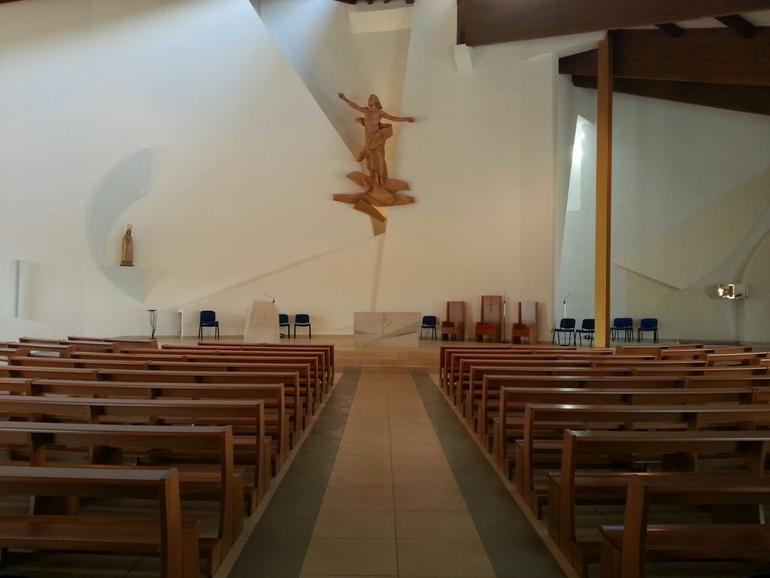 Apart from its constant internal reflection, this group aims at building a relationship of synergy also with architects in other parts of the world. Last December, for example, they participated at an international conference organised in Barcelona, Spain, by the Association of Catalonian Architects, on the theme of sacred patrimony. The team of architects took part not only as representatives of the Arts Centre in Loppiano, but also as part of the “Dialogue in Architecture” inundation of the Focolare Movement, which is composed of scholars and professionals whose main focus and interest revolves around the theme of architecture.
Apart from its constant internal reflection, this group aims at building a relationship of synergy also with architects in other parts of the world. Last December, for example, they participated at an international conference organised in Barcelona, Spain, by the Association of Catalonian Architects, on the theme of sacred patrimony. The team of architects took part not only as representatives of the Arts Centre in Loppiano, but also as part of the “Dialogue in Architecture” inundation of the Focolare Movement, which is composed of scholars and professionals whose main focus and interest revolves around the theme of architecture.
During this conference in Spain, three of the architects, Mario Mario Tancredi and Iole Parisi from Italy, and Tobias Klodwig from Germany, were asked to do a presentation entitled: “Flexible Christianity – Community Life and Sacred Spaces”. The approach that was presented greatly interested the 150 architects from Spain and other European countries who attended the conference.
The three speakers started off by explaining how forms and spaces in the field of architecture change according to the experience of different Christian communities. This generated a discussion and a reflection on the fact that architecture is always enriched by elements that are “intangible”, by what the very concept of “sacred” can assume in various cultural contexts: the strong social values perceived in Latin America; the prophetic ancestral signs found in Africa; the value of symbolic expressions contained in European cathedrals and churches in globalized metropolises. They pointed out a few concrete examples to illustrate this: the Church in Loppiano called Maria Théotokos, which is an expression of a contemporary charism, the Church of St Claire in Fontem, Africa, which communicates the values of the local culture, and some projects where disused churches in Germany had undergone a transformation.
With regards to the cultural research that “Dialogue in Architecture” aims to develop, it’s in continual evolution, driven by the need to bring together – precisely because it has to do with the Absolute One – continuity and innovation,and this is achieved by means of a dialogue which is evermore constructive both with the clientele and the academic world.
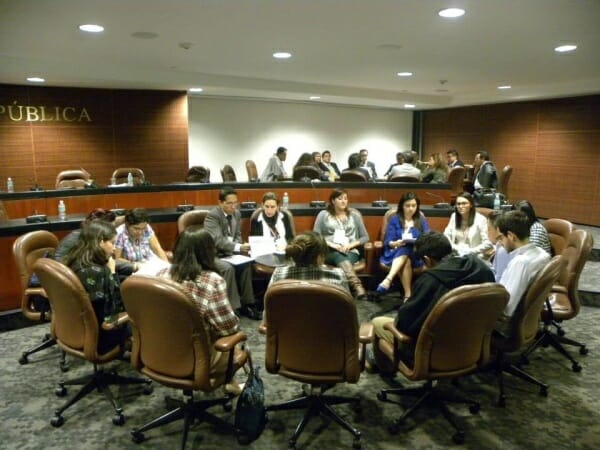
A look at Mexico: Youth and Politics
 “Hi, my name’s Abraham, and I come from Mexico: a population of noble and deeply religious people, with their arms spread out to the world.” These were his opening words to an audience of 300 young people in a hall of the Italian Parliament, who gathered to pay homage to Chiara Lubich and her prophetic vision of politics. Abraham has brought along his background in a country torn apart by narcotrafficking and the lords of death. He himself had lived the experience of having a gun pointed at his head by the police who mistook him for a drug pusher while the real one was standing beside him, forced by poverty to take that path. “In 2006,” he continued, “the battle against narcotraffic was a war that in eight years had left on the field more war victims than in Vietnam, among which were many innocent people who struggle every day to maintain their civil commitment: journalists, activists, etc. Often the people protested against the Government which has been losing its credibility amid a strong social and economic crisis”
“Hi, my name’s Abraham, and I come from Mexico: a population of noble and deeply religious people, with their arms spread out to the world.” These were his opening words to an audience of 300 young people in a hall of the Italian Parliament, who gathered to pay homage to Chiara Lubich and her prophetic vision of politics. Abraham has brought along his background in a country torn apart by narcotrafficking and the lords of death. He himself had lived the experience of having a gun pointed at his head by the police who mistook him for a drug pusher while the real one was standing beside him, forced by poverty to take that path. “In 2006,” he continued, “the battle against narcotraffic was a war that in eight years had left on the field more war victims than in Vietnam, among which were many innocent people who struggle every day to maintain their civil commitment: journalists, activists, etc. Often the people protested against the Government which has been losing its credibility amid a strong social and economic crisis”
“I live in Mexico City where every day, we are faced with a new challenge; despite this I believe in a united world and in the ideal of a united world and universal brotherhood. But I know that change has to start from myself, without expecting it from the others and not even from the authorities.”
“If I were you, who are so concerned for the common good in Mexico,” affirmed Luigino Bruni addressing the youth – I would try to look at the causes of this disease, among which is financial capitalism that increases the inequalities. These are types of wealth that are no longer inclusive.» «The first step to take when one wishes to change a country is to love it,» the economist underlined again, spurred by the testimonial of Abraham. «Every country has its vocation to beauty, its own genius, and identity, though ambivalent.» And then an advice: study more, learn a profession! «Are you a minority? It does not matter. Just a handful would suffice, few but really very motivated. It is the prophetic minority that changes the world. And do not stop believing that a different world is possible. The first battle to fight when we are young is to not lose faith in the ideal. We have to believe in the impossible in order to have a good possibility.“
“Some offered me drugs many times, others robbed me,” continued Abraham, “Some time ago while going home after school, a boy approached me asking for a cigarette. At the same time the police arrived to arrest us. He had drugs in his pocket while I only had books in my backpack. They started to beat him up while the other policeman held a gun at my head, asking me where the drugs were. When the police left, I helped this boy to his feet and gave him the little money I had. He embraced me and said: “You know, I feed my family with these few coins?” I realised how a small act of love really releases great strength and we never know how far it will go. Despite my feeling so helpless, I want to try and see my neighbours and the people I meet on the street with new eyes, and with other friends I want to give a concrete contribution.
“In my desire to a greater commitment for the good of my country, despite the many difficulties and discouragement of many, on 20 March the youth of diverse organisations met in the Mexican Senate for a day’s event with politicians on dialogue, which is very important in a world that is awaiting the answers to bigger challenges.”
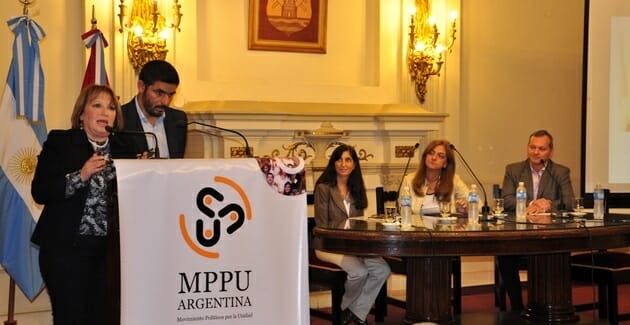
Argentina remembers Chiara Lubich
 “Chiara Lubich has brought understanding and gentleness, but basically what she has given to us, through her simplicity, is a great current of love towards the other person. To live in community, to know how to share, to work for the common good and to succeed in building fraternity also through diverse political viewpoints, this in summary is her message.” So stated Alicia Monic Pregno, Vice-Governor for the Province of Cordoba (Argentina), in the context of this international acknowledgement of the inheritance transmitted through the thought and life of Chiara Lubich. During its session on 25 March 2015, the House of Representatives in the Province, approved the posthumous decree in recognition of the Work of Focolare Movement founder.
“Chiara Lubich has brought understanding and gentleness, but basically what she has given to us, through her simplicity, is a great current of love towards the other person. To live in community, to know how to share, to work for the common good and to succeed in building fraternity also through diverse political viewpoints, this in summary is her message.” So stated Alicia Monic Pregno, Vice-Governor for the Province of Cordoba (Argentina), in the context of this international acknowledgement of the inheritance transmitted through the thought and life of Chiara Lubich. During its session on 25 March 2015, the House of Representatives in the Province, approved the posthumous decree in recognition of the Work of Focolare Movement founder.
The ceremony was held in the same parliamentary hall in the presence of a huge crowd which included members of parliament of different political parties, representatives of Comipaz (Interreligious Committee for Peace), young political students of the Movement of Politics & Policies for Unity, university professors, members of social organisation, and others.
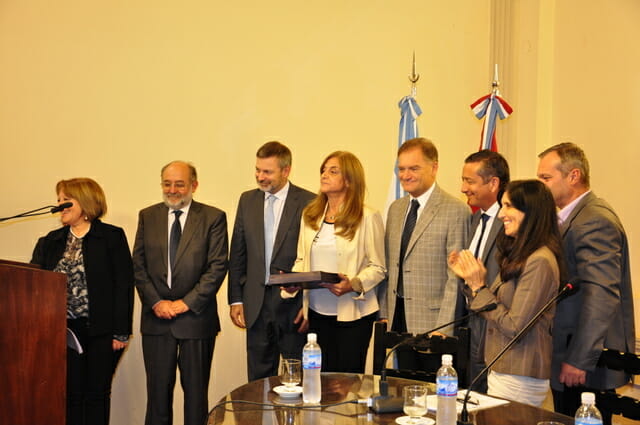 The delegates of the Focolare Movement in Cordoba presented the figure of Chiara Lubich and immediately afterwards the Vice-Governor invited politicians from different political parties to carry out the symbolic gesture of consigning to them, all together, the decree and the commemorative plaque.
The delegates of the Focolare Movement in Cordoba presented the figure of Chiara Lubich and immediately afterwards the Vice-Governor invited politicians from different political parties to carry out the symbolic gesture of consigning to them, all together, the decree and the commemorative plaque.
Alicia Monica Pregno then went on to explain the motivations for the award: the contribution towards the building up of a community which promotes the “spirituality of unity”, adding that “Lubich’s message raises many questions which lead us to reflect on the reason behind all the conflicts, on why we are not always able to think things out together.” She said, “I believe that the world is called to journey towards a better destiny, and this is achievable in the measure that we lay aside our personal interests and are open to resolve issues through a shared outlook. This is a great challenge in these times characterised by much individualism.”
Pastor Raffa, representing Comipaz, then spoke. He emphasised the contribution of the charism of Chiara Lubich to the “birth of this commission right from the beginning”; and Soher El Sucaría, political activist, shared how through an experience lived within the Interreligious Committee for Peace, the value of this service became more and more evident.
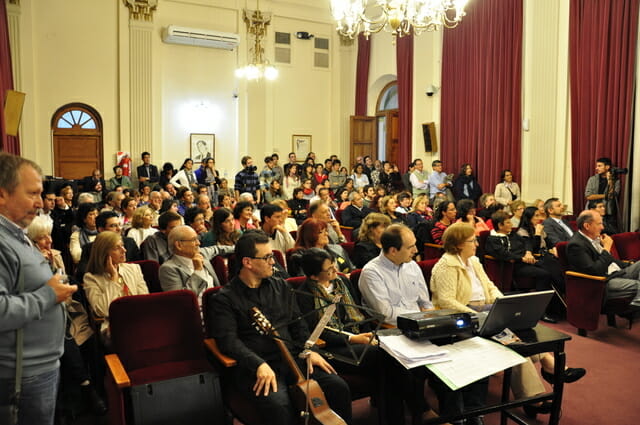 Several testimonies by individual citizens then followed. They told stories of personal transformation and their commitment to local politics: from joining forces with neighbours in order to resolve the problems of their neighbourhoods, to assuming political commitment on a regional and national level. This part of the program was conducted through two round tables. The first, entitled “Fraternity, Seed of Social Transformation”, included the participation of Estela Daima (Director of a Caritas Department in Rio III which conducts a break-making activity involving 40 women), Paola Chávez, Secretary of Fazenda de la Esperanza association (who presented the testimony of Agustina, a reformed juvenile criminal), and Ricardo Galli, economist and entrepreneur of an Economy of Communion project.
Several testimonies by individual citizens then followed. They told stories of personal transformation and their commitment to local politics: from joining forces with neighbours in order to resolve the problems of their neighbourhoods, to assuming political commitment on a regional and national level. This part of the program was conducted through two round tables. The first, entitled “Fraternity, Seed of Social Transformation”, included the participation of Estela Daima (Director of a Caritas Department in Rio III which conducts a break-making activity involving 40 women), Paola Chávez, Secretary of Fazenda de la Esperanza association (who presented the testimony of Agustina, a reformed juvenile criminal), and Ricardo Galli, economist and entrepreneur of an Economy of Communion project.
In the round table entitled “The Contribution of Fraternity to Politics: Experiences and Challenges”, Laura Blanco, a socialist, presented the Schools of Politics organised in Parliament House, as well as her commitment to live fraternity in the political arena. Other speakers included Julio Bañuelos, Mayor of Mina Clavero, and Guillermo Castillo, member of the Christian Democratic Party and public administrator.
In all those present there was the certainty that when fraternity is lived as a political goal, it provides answers to the challenges of today which call for a society that is more just and all-embracing.
In conclusion, the Vice-Governor expressed her appreciation that the Parliament of Cordoba is the centre for the Schools of Politics for young people and underlined the efforts which are being made in living the concept of fraternity within Parliament itself.

We can feel the nails
 “Oh, there’s a light with nails on it!
“Oh, there’s a light with nails on it!
So exclaims a child in front of the Paschal candle.
We can feel the nails.
But can we see the Light?
And what about us … do we give out light?
We are nailed
to ourselves and to others;
to our time and our responsibilities.
The Holy One has allowed himself to be nailed to our cross.
And it was from there that he come down.
He was nailed right up until he died.
In this way he became light for everyone;
that light which penetrates closed doors.
He is risen
and shows the signs of the nails.
Light which was nailed.
We feel the nails.
But can we see the Light? And what about us … do we give light?
(From a pastoral letter on the occasion of Easter 1984)
Klaus Hemmerle, “La luce dentro le cose”, Città Nuova, Rome 1998, p. 109.


